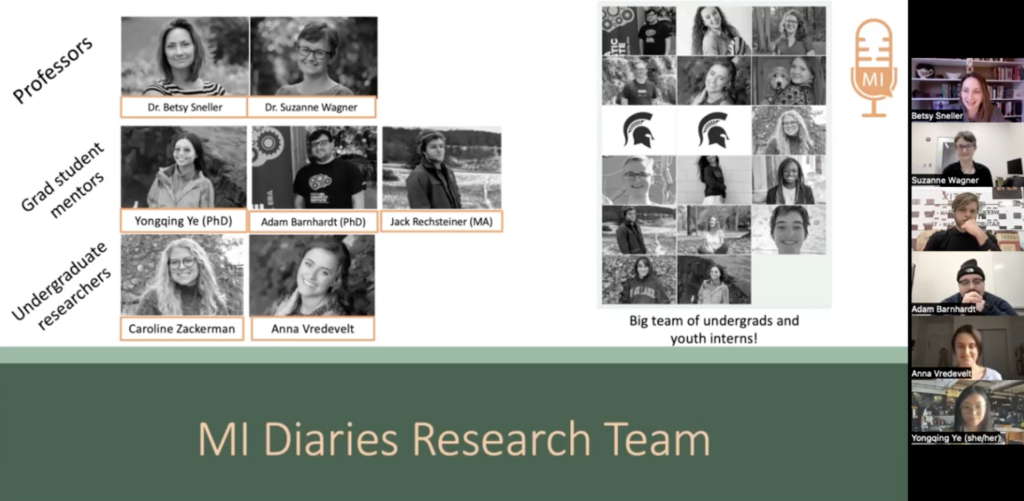Dr. Dan Villarreal (University of Pittsburgh) is visiting the Sociolinguistics Lab in early November. He’ll be giving a talk, open to the public, on Thursday November 3, 2022. Dan’s presentation is of special interest to us because it’s about automating analyses of large-scale datasets. As we build a corpus of Michigan speech in the MI Diaries project, we’ve been using automatic speech recognition (ASR) to speed up our transcription time, and working with MSU’s Institute for Cyber-Enabled Research (ICER) to move some of our data processing to their supercomputer.
Dr. Villarreal is also giving a talk to the SoConDi group at University of Michigan on Nov 4th, 2022, 3-4pm. If you are interested in joining that talk, please contact Yongqing Ye (yeyongqi@msu.edu) or Suzanne Wagner (wagnersu@msu.edu) for the Zoom link.
Sociolinguistic auto-coding: Applications and pitfalls
Dan Villareal, University of Pittsburgh
Time: Thursday, Nov 3, 4:30-6:15pm
Location: Wells Hall B342 and on Zoom
Researchers in sociophonetics and variationist sociolinguistics have increasingly turned to computational methods to automate time-consuming research tasks such as data extraction (e.g., Fromont & Hay 2012), phonetic alignment (e.g., McAuliffe et al. 2017), and accurate vowel measurement (e.g., Barreda 2021). In this talk, I discuss the advantages and challenges of using sociolinguistic auto-coding (SLAC), a method in which machine learning classifiers assign variants to variable data (Kendall et al. 2021; McLarty, Jones & Hall 2019; Villarreal et al. 2020; Villarreal under review).
Villarreal et al. (2020) trained random forest classifiers of two sociolinguistic variables of New Zealand English, non-prevocalic /r/ (varying between Present vs. Absent) and intervocalic medial /t/ (Voiced vs. Voiceless), using over 4,000 previously hand-coded tokens (per variable). Cross-validation revealed accuracy rates of 84.5% for /r/ and 91.8% for /t/. In addition to binary predictions, these auto-coders calculate classifier probabilities: the likelihood that a given /r/ token was Present, or a /t/ token was Voiced. In a listening experiment in which 11 phonetically trained listeners coded 60 /r/ tokens, we found a significant positive linear relationship between classifier probability and human judgments; this indicates that classifier probability successfully captures listeners’ perception of phonetically gradient rhoticity. Finally, auto-coders can report which features were most important in classification, helping to shed light on acoustically complex variables like /r/. In short, SLAC can be used for at least three specific functions: binary coding, gradient ‘coding’, and feature selection.
Like other machine learning (ML) methods, however, there are inherent concerns about SLAC’s fairness—that is, whether it generates equally valid predictions for different speaker groups (e.g., Koenecke et al. 2020). First, given that there are multiple definitions of ML fairness that are mutually incompatible (Berk et al. 2018; Corbett-Davies et al. 2017; Kleinberg et al. 2017), fairness metrics must be decided upon within individual research domains; I argue for three fairness metrics relevant to the domain of sociolinguistic auto-coding. Second, I re-analyze Villarreal et al.’s (2020) /r/ auto-coder for fairness; I find poor performance on all three fairness metrics, with women’s tokens coded more accurately than men’s (88.8% vs. 81.4%). Third, to remedy these imbalances, I used the same data to test a variety of unfairness-mitigation strategies from the ML fairness literature; I find substantial improvement with respect to fairness, albeit at the expense of predictive performance.
Given these fairness issues, I reconsider SLAC under Markl’s (2022) premise that some speech and language technologies are too inherently flawed to use. I argue that while SLAC does not fit into this category, its potential users and consumers deserve a “warts and all” awareness of its drawbacks. To that end, I close with concrete recommendations for using SLAC in large-scale research projects.
References
Barreda, Santiago. 2021. Fast Track: fast (nearly) automatic formant-tracking using Praat. Linguistics Vanguard 7(1). https://doi.org/10.1515/lingvan-2020-0051.
Fromont, Robert & Jennifer Hay. 2012. LaBB-CAT: An annotation store. Proceedings of Australasian Language Technology Association Workshop 113–117.
Kendall, Tyler, Charlotte Vaughn, Charlie Farrington, Kaylynn Gunter, Jaidan McLean, Chloe Tacata & Shelby Arnson. 2021. Considering performance in the automated and manual coding of sociolinguistic variables: Lessons from variable (ING). Frontiers in Artificial Intelligence 4(43). https://doi.org/10.3389/frai.2021.648543.
Markl, Nina. 2022. Language variation and algorithmic bias: Understanding algorithmic bias in British English automatic speech recognition. In 2022 ACM Conference on Fairness, Accountability, and Transparency (FAccT ’22), 521–534. New York, NY, USA: Association for Computing Machinery. https://doi.org/10.1145/3531146.3533117.
McAuliffe, Michael, Michaela Socolof, Sarah Mihuc, Michael Wagner & Morgan Sonderegger. 2017. Montreal Forced Aligner: Trainable text-speech alignment using Kaldi. In.
McLarty, Jason, Taylor Jones & Christopher Hall. 2019. Corpus-based sociophonetic approaches to postvocalic r-lessness in African American Language. American Speech 94. https://doi.org/10.1215/00031283-7362239.
Villarreal, Dan. under review. Sociolinguistic auto-coding has fairness problems too: Measuring and mitigating bias. Linguistics Vanguard.
Villarreal, Dan, Lynn Clark, Jennifer Hay & Kevin Watson. 2020. From categories to gradience: Auto-coding sociophonetic variation with random forests. Laboratory Phonology 11(6). 1–31. https://doi.org/10.5334/labphon.216.




